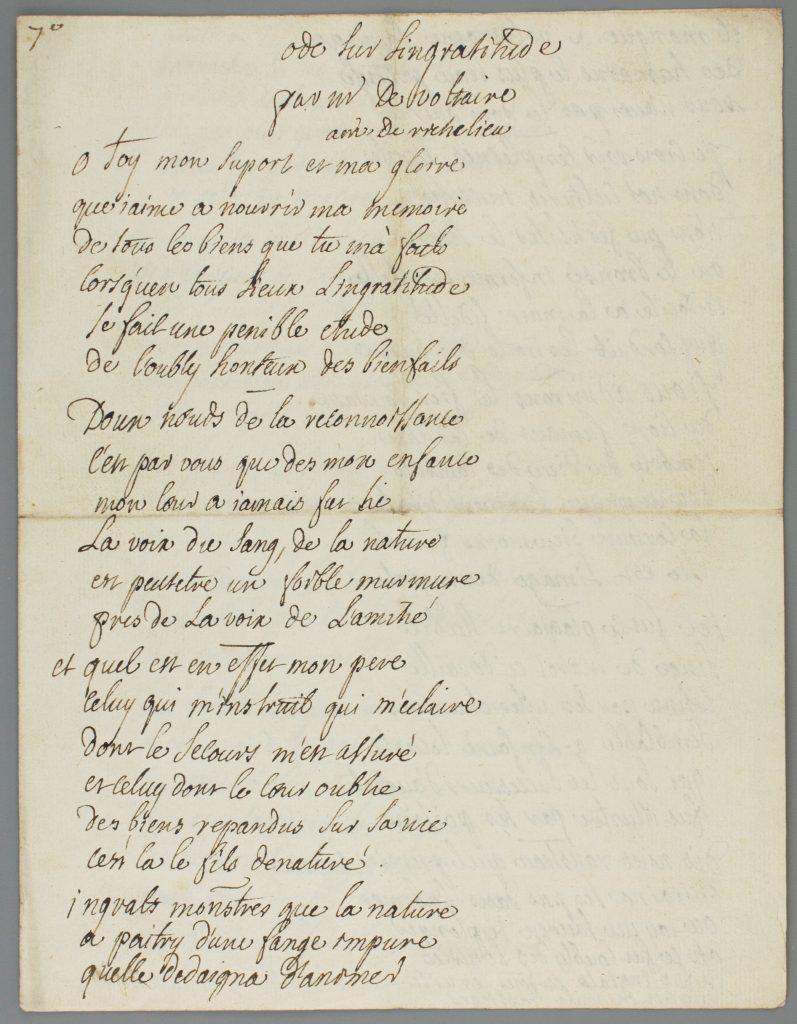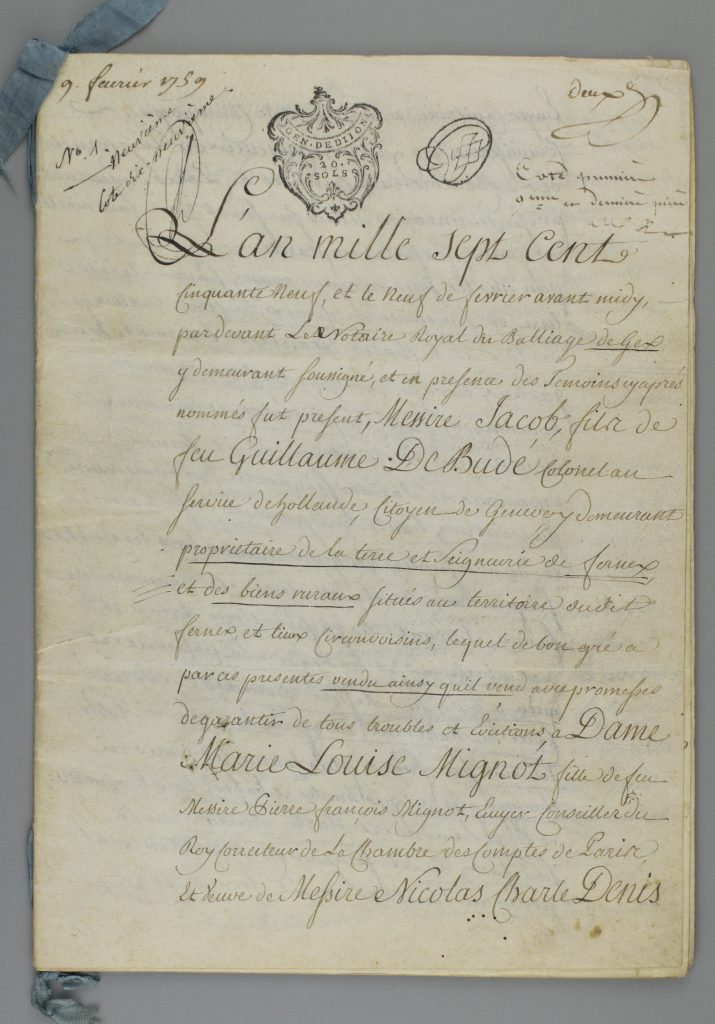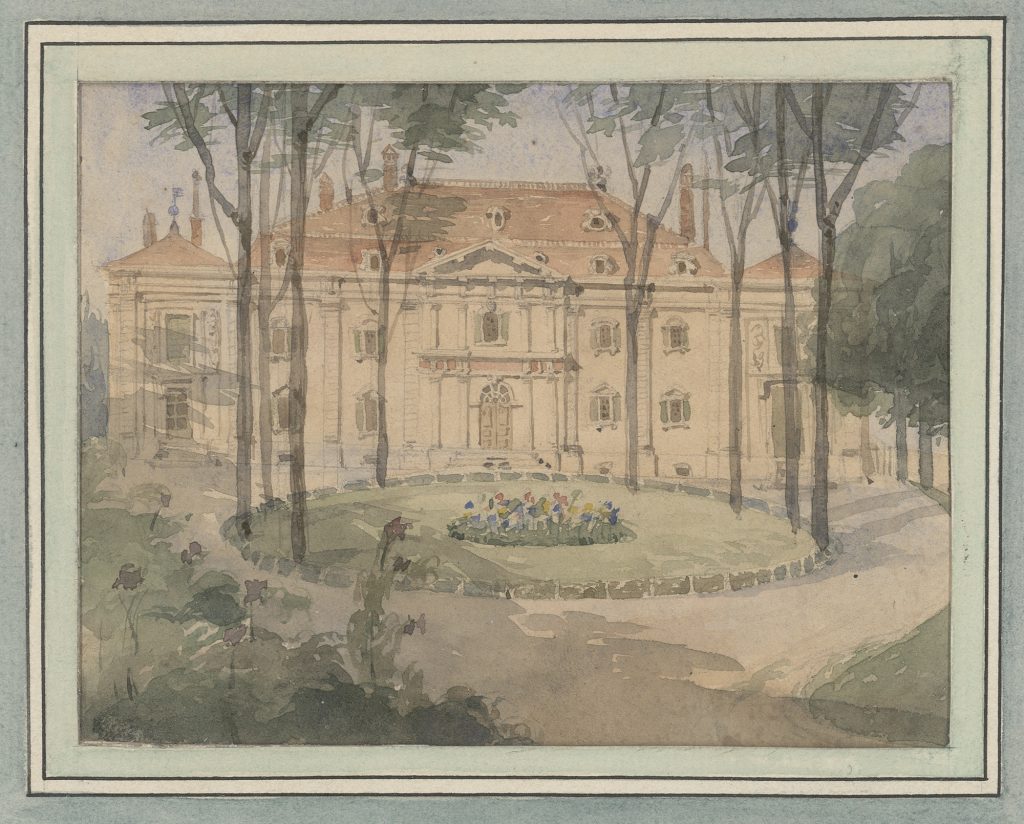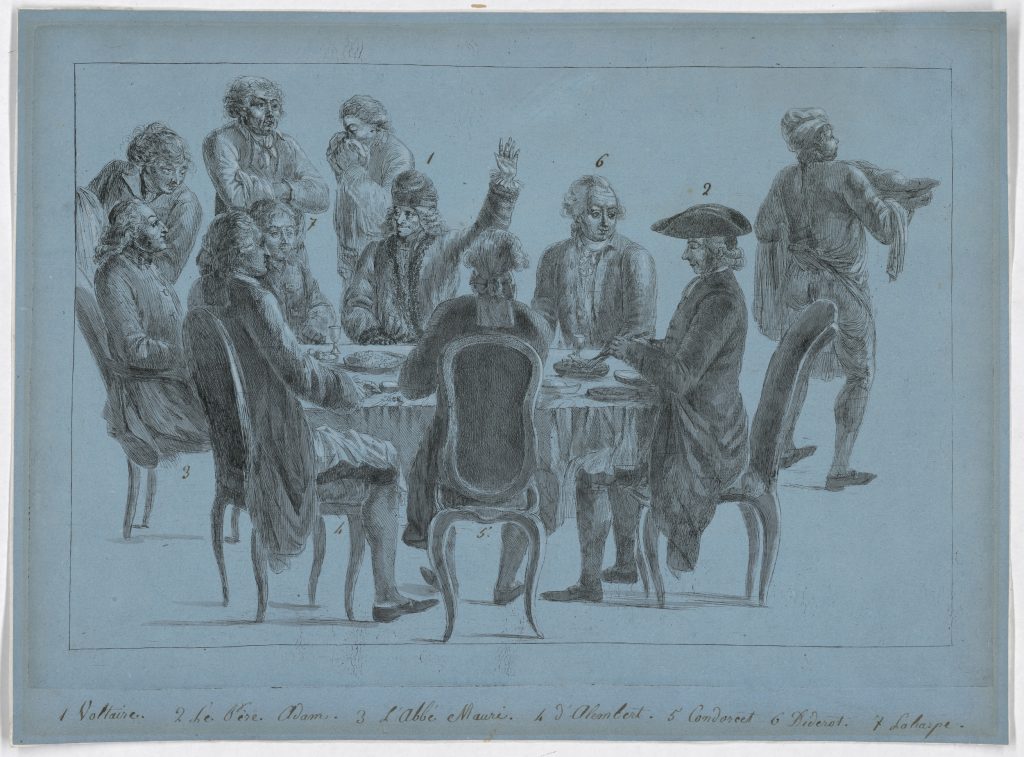By Ann Marie Holland, Curator Enlightenment Collections, Rare Books and Special Collections
During his lifetime, Voltaire was a prolific and well-connected correspondent. A selection of his letters now resides at McGill in the Jacqueline Lambert-David Collection. Read more about this extraordinary collection.
An exceptional Estate Gift of manuscripts relative to Voltaire (1694-1778) was recently entrusted to the McGill Library by Professor Emeritus Peter Lambert-David Southam. During his lifetime, Voltaire built an extensive network of some 1800 correspondents, with more than 16,000 letters to his name, a stupefying number. “The overall impression is one of an astonishing ‘presence’ in the world.”[1]
The Jacqueline Lambert-David Voltaire Manuscript Collection (JLD) consists of 300 manuscripts, some of which are unpublished, featuring private letters; literary and historical manuscripts. Precious documents shed new light on the life and mind of the dominant philosophe of the French Enlightenment. Voltaire’s epistolary talent especially comes to life in 140 pieces of correspondence, half of which are signed autograph letters, bearing addresses and traces of red wax seals.
Among the historical gems in the collection, there are spirited exchanges with encyclopédistes like Jean Le Rond d’Alembert. From members of the book trade, we witness discussions with Charles Joseph Panckoucke, the most prominent publisher of the times. Voltaire intermingled with high-ranking figures as well, which form a good part of the correspondence files with examples from Frederick II, King of Prussia.
Voltaire often integrated witty morsels of verse into his correspondence, an esteemed literary art form of the times. “Voltaire had from an early age, been part of this poetic culture, and he remained always faithful to it.” [2] He also composed separate pieces of verse destined for private readings as a form of light entertainment, and no doubt, to serve up serious food for thought.


The JLD Collection presents a fascinating section of poetry (odes, sonnets, epistles, epigrams, and epitaphs) penned by Voltaire, his admirers, and even his adversaries.
The Collection also enriches our understanding of the last 20 years of his life, during which Voltaire lived at the château de Ferney. Located on the border of Switzerland near Geneva, Ferney became a bustling place with guests travelling from all over Europe to pay the aging cultural icon a visit.
Voltaire thrived at Ferney as a writer and as an advocate and defender of rights and freedoms in numerous causes. Documented in the collection is Voltaire’s leadership of the 1761 campaign demanding justice for the watchmaker Ambroise Decroze and his son, who had been senselessly beaten by order of a local priest, Philip Ancian.
Several pieces illustrate Voltaire’s remarkable involvement in the transformation of Ferney from a rural village into a centre for light industry, notably through the nifty pocket–watch venture that Voltaire helped to promote. 3

According to the preeminent scholar Theodore Besterman (1904-1976), who established the ‘definitive edition’ of the corpus of Voltaire, there are some 20,000 manuscript letters to and from Voltaire. Apparently, only a portion of these, an estimated 13,000, have been located, seen and described.
The hazards of manuscripts are intrinsic to their ephemeral nature. Sent letters might have miscarried before reaching their intended recipient. Letters safely delivered might subsequently have been damaged, lost, or destroyed. As for textual manuscripts, these may not have been kept in lieu of a newly released printed copy.
Due to the careful management and diligent acquisitions over four generations of collectors from the Lambert-David family, the McGill Library now has a sliver of the manuscript pie. In a recent lecture by our guest speaker, Professor Nicholas Cronk said “the Library of McGill has now become one of the major centres in the world for the study of Voltaire. What makes the McGill Voltaire Collection special is that it has come together from several gifts and different sources and so has many facets and characteristics”. [4]
This includes the major acquisition of the J. Patrick Lee Voltaire Collection in 2013, along with the Voltaire autograph letters and iconography contained in the generous donation in 2022 by Professor Edward M. Langille. Combined, they contribute to a formidable research collection, bridging British and continental communities through print and manuscript culture.
- Christiane Mervaud, “Voltaire’s Correspondence” in The Cambridge Companion to Voltaire (London: 2009),ed. by Nicholas Cronk, p.155.
- Ibid., p.156.
- See Roger Pearson, Voltaire Almighty (London: Bloomsbury, 2005).
- Link to lecture Oct. 18, 2023 “Voltaire’s manuscripts: Traces of Celebrity,”by Nicholas Cronk, Director of the Voltaire Foundation, Oxford and Professor of Enlightenment Studies.
La présence d’un grand écrivain
par Ann Marie Holland, conservatrice du fonds des Lumières, Livres rares et fonds spéciaux
Voltaire a entretenu une correspondance prolifique tout au long de sa vie. L’Université McGill possède une sélection de ses lettres, réunies dans l’extraordinaire collection Jacqueline Lambert-David.
Le professeur émérite Peter Lambert-David Southam a récemment fait don à la Bibliothèque de McGill d’un legs exceptionnel de manuscrits associés à Voltaire (1694-1778). Au cours de sa vie, Voltaire a entretenu une impressionnante correspondance avec quelque 1 800 personnes, qui totalise non moins de 16 000 lettres. « La collection témoigne de la présence marquante de l’homme dans le monde. »[1]
La collection Jacqueline Lambert-David (JLD) de manuscrits voltairiens réunit 300 lettres privées, manuscrits littéraires ou historiques et autres documents précieux, dont certains inédits, qui jettent un nouvel éclairage sur la vie et l’esprit du plus grand philosophe des Lumières. Plus particulièrement, 140 pièces montrent le talent épistolaire de Voltaire, dont la moitié sont des lettres autographes portant son adresse et des traces de son sceau.

Parmi les joyaux de la collection figurent des échanges passionnés avec des encyclopédistes, notamment Jean Le Rond d’Alembert, et avec des figures du monde littéraire, comme Charles Joseph Panckoucke, le plus éminent éditeur de son temps. Voltaire entretenait aussi une correspondance avec des personnes de haut rang, notamment Frédéric II, roi de Prusse.
Les lettres de Voltaire étaient semées de vers pleins d’esprit, une forme d’art littéraire très prisée à l’époque. « Voltaire a été initié à la culture poétique dès son plus jeune âge et y est resté fidèle toute sa vie. » [2] Il a également écrit des œuvres en vers destinées à un lectorat privé, pour divertir et, sans aucun doute, alimenter la réflexion. (Image – Poème de Voltaire, Ode sur l’ingratitude, 1736.) La collection JLD comporte une fascinante section d’œuvres poétiques (odes, sonnets, épîtres, épigrammes, épitaphes) composées par Voltaire lui-même, ses admirateurs et même ses adversaires.
Elle nous éclaire sur les 20 dernières années de sa vie, qu’il a passées au château de Ferney. Situé à la frontière suisse, près de Genève, Ferney était alors un lieu d’effervescence où défilaient des invités venus des quatre coins de l’Europe rendre visite à cette icône de la littérature.


Durant cette période, Voltaire était un auteur prolifique et un ardent défenseur des droits et libertés, prenant fait et cause pour de nombreuses personnes. Le fonds témoigne également de son rôle prépondérant dans la campagne de 1761 réclamant justice pour l’horloger Ambroise Decroze et son fils, sauvagement battu sur ordre de Philipe Ancian, un curé de la région.
Plusieurs pièces rendent compte de l’énergie qu’il a investie dans la rénovation de son terrain et la transformation du village rural de Ferney en un centre d’industrie légère, dont il a fait sans relâche la promotion de la manufacture de montres de poche.[3]

Selon Théodore Besterman (1904-1976), qui a établi l’édition définitive de la correspondance de Voltaire, celle-ci comprend environ 20 000 lettres manuscrites qui lui sont adressées ou sont écrites par lui. Cependant, seules 13 000 ont été trouvées, lues et décrites.
De par leur nature éphémère, les manuscrits ont un avenir incertain. Certaines lettres n’ont peut-être jamais été livrées à leur destinataire. D’autres ont été endommagées, perdues ou détruites. Quant aux manuscrits d’ouvrages, ils n’étaient pas toujours conservés après leur impression.
Grâce aux quatre générations de la famille Lambert-David qui ont soigneusement acquis et conservé cette collection exceptionnelle, la Bibliothèque de McGill possède aujourd’hui une petite part de l’héritage de Voltaire. Lors d’une récente conférence, le professeur Nicholas Cronk a déclaré : « La Bibliothèque de McGill est maintenant l’un des plus importants centres dans le monde pour l’étude de l’œuvre de Voltaire. Sa collection a ceci de particulier qu’elle est constituée à partir de dons de différentes sources, ce qui lui confère une variété de facettes et de caractéristiques. » [4]
Mentionnons l’acquisition majeure de la collection J. Patrick Lee sur Voltaire en 2013, ainsi que les lettres autographes et l’iconographie constituant le généreux don du professeur Edward M. Langille en 2022. Aujourd’hui, ces pièces viennent enrichir un formidable fonds unissant les milieux de recherche britannique et continental autour de la culture imprimée et manuscrite.
- Christiane Mervaud, “Voltaire’s Correspondence” dans The Cambridge Companion to Voltaire (Londre: 2009), ed. par Nicholas Cronk, p.155.
- Ibid., p.156.
- Voir Roger Pearson, Voltaire Almighty (Londre: Bloomsbury, 2005).
- Visionner la conférence du 18 Oct. 2023 “Voltaire’s manuscripts: Traces of Celebrity,” par Nicholas Cronk, Directeur de la Fondation de Voltaire, Oxford et Professeur d’études sur le siècles des Lumières.













Leave a Reply
You must be logged in to post a comment.